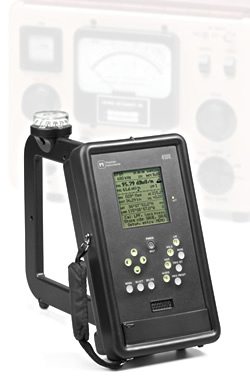Summary
The PI-4100 is Potomac’s third generation of precision survey instrumentation intended for the direct measurement of electromagnetic field strength in the 520 kHz to 5.1 MHz frequency spectrum. This instrument combines a laboratory quality radio frequency voltmeter, a calibrated, shielded loop antenna, an internal GPS receiver, an internal calibration source, and data acquisition hardware and software in a single rugged package weighing less than 3 kg.
This device is equipped with an embedded microcontroller engine that obtains measurement data from the various transducers within the instrument and formats that data for display and, at the option of the use, stores it to memory.
Features
The PI-4100 was designed to become the successor to the industry standard FIM-41 and to provide the accuracy and reliability that has been depended upon by the international engineering community, government regulators, and broadcast licensees for more than a generation.
PI-4100 innovations include:
- 116 dB dynamic range tuned RF voltmeter
- Digitally synthesized tuning in 1.0 kHz increments
- Spectrum display to facilitate various compliance measurements (Field Strength, Harmonic level, and Spectrum Occupancy) in a single instrument
- Provisions for third party calibration – using their laboratory standards – when it is impractical to return the instrument to the manufacturer for calibration
- Data acquisition software and PC interface to enable the collection, analysis, and e-distribution of current field measurements. (This feature anticipates the future acceptance of data e-filing by federal regulatory agencies.)
Various I/O ports have been provided to enhance the versatility of the instrument and to perform certain operational tasks such as battery recharge and computer data exchange.
Technical Specification
Technical Specification
| Field Strength Meter | |
| Frequency Range | 520 kHz to 5.1 MHz, calibrated |
| Field Strength Range | 22 µV/M to 50 V/M (27 dBuV/m) to 154 dBuV/m) |
| Measurement Uncertainty | 3.0% (±0.3 dB) referenced to NIST*, standard field |
| Selectivity Measurement Bandwidth Adjacent Channel Rejection Image Rejection Spurious Rejection |
1.0 kHz>85 dB at ±9 kHz>60 dB>80 dB |
| Minimum Frequency Step | 1.0 kHz |
| Self generated 2nd & 3rd harmonics | <-85 dBc (carrier F/S <10 V/M, from 530 to 1700 kHz) |
| Antenna Type | Balanced, multiturn Loop (removeable) |
| RF Voltmeter | |
| Electrical specifications shown above | RF Signal is applied directly to RF In BNC |
| Measurement Units | µV-mV-V; mV only; dBuV/m |
| Spectrum Display | |
| Center Frequency Range | 520 kHz to 5.1 MHz |
| Frequency Span | ±63 kHz, ±22 kHz |
| Resolution Bandwidth | 1 kHz |
| Data Storage & Retrieval | |
| Measurement Points | 250 max. |
| Download Software | PI Proprietary (Microsoft Excel® format compatible) |
| Download Format | ASCII: Comma Delimited |
| I/O Ports | |
| Headphone Jack | 3.5 mm Stereo Audio Jack |
| Battery Charging Jack (12-15 Vdc) | 2.1 mm Power Jack (Switchcraft 722A or equiv.) |
| Data output / Control Input Jack | USB Type B (for bi-directional computer interface) |
| External RF Calibration Jack | BNC (provides for calibration by a 3rd party cal. lab.) |
| External RF Input Jack | BNC (input impedance 1890 ohm +12pF) provides for antenna signal injection |
| External RF Output Jack | BNC (50 ohms) RF output is proportional to Field Strength |
| General | |
| Batteries (AA cells, six required) | Rechargeable; NiMH (supplied)(can also use 1.5V: Alkaline or Lithium) |
| Battery Life | 5 Hrs. Minimum before Recharge (NiMH) |
| Battery Recharge Time | 3 to 4 Hours |
| Operating Temperature Range °C(°F) | -15°C to +50°C (+5°F to +130°F) |
| Dimensions cm (inches) | 38x18x28 cm (15x7x11 in.) |
| Weight kg (lbs.) | 2.5 (5.5) |



